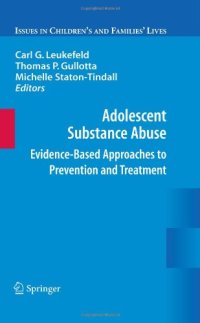
Ebook: Adherence to Pediatric Medical Regimens: 2nd Edition
Author: Michael A. Rapoff (auth.)
- Tags: Child and School Psychology, Pediatrics, Clinical Psychology, Health Psychology, Psychiatry
- Series: Issues in Clinical Child Psychology
- Year: 2010
- Publisher: Springer US
- Edition: 2
- Language: English
- pdf
It used to be called noncompliance, and the patients themselves referred to as difficult. But regardless of the terminology, children’s reluctance or failure to commit to prescribed regimens reduces the effectiveness of treatment, often leading to additional care, higher costs, and serious, even deadly, complications.
Reflecting a single, authoritative voice, the Second Edition of Adherence to Pediatric Medical Regimens analyzes in comprehensive clinical detail the factors that affect children’s and teens’ commitment to treatment – from developmental issues to the influence of parents, peers, and others in their orbit – and offers empirically sound guidelines for encouraging adherence. It cautions against viewing young clients as miniature grownups or scaling down adult data, advocating instead for a more nuanced understanding of the population and a collaborative relationship between practitioner and client.
Critical areas of interest to clinicians and researchers in pediatrics are brought into clear focus as the book:
- Provides an overview of adherence rates to chronic and acute disease regimens and examines common adherence problems in children and adolescents.
- Details consequences of nonadherence and correlates of adherence.
- Critiques major adherence theories and their clinical implications.
- Discusses the range of adherence assessment measures.
- Reviews educational, behavioral and other strategies for improving adherence.
- Offers ways to translate research into pediatric medical adherence.
This updated edition of Adherence to Pediatric Medical Regimens is an essential reference for anyone concerned with improving health outcomes in young people, especially clinicians, researchers, and graduate students in psychiatry as well as pediatric, clinical child, and health psychology.
Substance abuse is, and has always been, an indisputable fact of life. People – especially young people – abuse various legal and illegal substances for any number of reasons: to intensify feelings, to achieve deeper consciousness, to escape reality, to self-medicate. And as substance-abusing teenagers mature, they pose particular challenges to the professionals charged with keeping them clean and sober and helping them maintain recovery into adulthood. Adolescent Substance Abuse: Evidence-Based Approaches to Prevention and Treatment offers clear, interdisciplinary guidance that grounds readers in the many contexts – developmental, genetic, social, and familial among them – crucial to creating effective interventions and prevention methods. Its contributors examine current findings regarding popularly used therapies, including psychopharmacology, residential treatment, school- and community-based programs, group homes, and specific forms of individual, family, and group therapy. Accessible to a wide professional audience, this volume: (1) Presents evidence-based support for the treatment decision-making process by identifying interventions that work, might work, and don’t work. (2) Identifies individual traits associated with susceptibility to substance abuse and addiction in youth. (3) Provides a biogenetic model of the effects of drugs on the brain (and refines the concept of gateway drugs). (4) Evaluates the effectiveness of prevention programs in school and community settings. (5) Adds historical, spiritual, and legal perspectives on substance use and misuse. (6) Includes the bonus resource, the Community Prevention Handbook on Adolescent Substance Abuse and Treatment. This volume is an all-in-one reference for counseling professionals and clinicians working with youth and families as well as program developers in state and local agencies and graduate students in counseling and prevention.